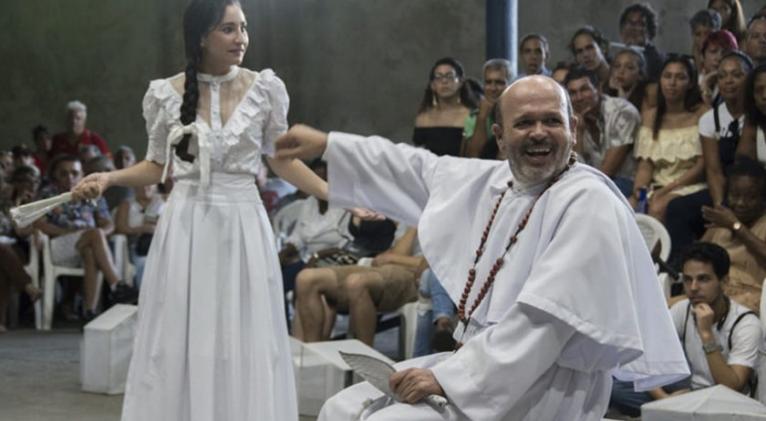Osvaldo Doimeadios and his Oficio de Isla
especiales

Versatile, chameleonic, he has the gift to make us laugh and simultaneously, invites us to reflect or cry as if theater were the life itself. Osvaldo Doimeadios has become a popular actor, beloved, without making concessions.
He has just told us about his theater project where dramatic actor, the humorist, the writer, the director and the master, all coexist. Doime embodies each of them.
What is Nave Oficio de Isla?
"The concept that we defend is that of creative community, because that is precisely the way we conceive the work, from multidisciplinarity, convergence on the stage by artists from different art branches such as music, visual arts, dance. This was the concept that we envisaged for the Oficio de Isla show, which is our first show.
"This show, that we premiered in 2019, got us on to the idea of what this project could become, which is a community of interests of artists from different backgrounds who live together in a center that is the Nave Oficio de Isla. We are anchored in Avenida del Puerto, on the upper side of former Almacenes San Jose, a beautiful venue bequeathed to us by Dr. Eusebio Leal to foster this type of project that breaks with the standards in the world of entertainment, precisely in terms of the coexistence of cultural disciplines on stage.
"In addition to the production and circulation of performances for the public, we work on another line, which is that of Training with students from ISA and ENA. The project also has a social vocation since we have to act on the community. The facility is thought to be a place that focuses on the figure of the actor and all the cultural disciplines that, in some way, affect the art of the actor from design, text, among others.
"We also have organized spaces for debate, cultural colloquiums, literary meetings, projection of audiovisual materials, among others."
How does Nave Oficio de Isla connect with the community?
"We are anchored at the gates of San Isidro, a community with a strong social tradition, the neighborhood where Martí was born. A place with a tradition of dockers. It is an area where marginality coexists, associated with the port area, but it is also a territory rich in traditions such as the Cuban rumba.
"We have performed there and little by little, they have been brought closer, as an audience. We are also doing activities for children and that is generating empathy, a relationship that is not univocal. We are not there in the community to change anyone’s life, but to contribute to coexistence and dialogue with community projects."
Do you believe that such transdisciplinarity and diversity within the staging itself works better in present stage?
"Each group is an experience. I try to be flexible as we, the actors, must be in many media at the same time and in this way we are doing it, with more flexibility, we have a higher level of involvement.
"In our group there are actors from different backgrounds, from different aesthetics, from different training, there are even students who are working with us. As a result, the show is now pretty solid. There are musicians who get acting role, and actors making music.
The show we are working in, Luz, puts faith in it.
What are the goals of Nave Oficio de Isla?
"For now, we aim to develop all lines: creation, research, training. We try to make our work a dynamic exercise every day.
"Almacenes San José is a fairly large space. It is a popular art fair. Craftsmen and artists who work in that fair have a good relationship with us. We are trying to make that space more dynamic, to open the spectrum not only to the hall we have, but everything. We aim to turn it into a cultural center where young artists have a place to launch their works, on an experimental basis, perhaps. We began to present some small-format performances on Thursdays.
"For example, within the Havana’s International Book Fair, as a secondary venue, we have had book presentations, colloquiums, poets’ gatherings, troubadours’ jam sessions."
In your opinion, what is the role of Cuban theater in these critical, post-pandemic times we are living in?
“I am not going to speak to you on behalf of the theater community because it would be too pretentious, but on behalf of what we do, what I am doing. After spending years of confinement, of this tough pandemic, of not touching each other, of not expressing ourselves I think that producing shows and the public may return to theaters is paramount, at the level of feelings. We are here to revive that approach with the audience. I think that is the most important thing and what I defend from my perspective.”
Translated by Sergio A. Paneque Díaz / CubaSí Translation Staff














Add new comment